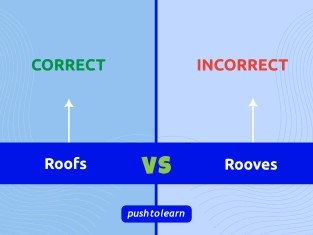by PushtoLearn
Monkeys vs Monkies
Table of Contents
Explanation
"Monkeys" is the correct plural form of the word "monkey." In English, when a noun ends in a vowel followed by a "y" (like "monkey"), the plural is typically formed by simply adding an "s" at the end.
✔️ Correct: We saw several monkeys at the zoo.
❌ Incorrect: We saw several monkies at the zoo.
Why "Monkeys" Is Correct
Rule for Pluralization: For nouns ending in a vowel plus "y," you add "s" to form the plural.
Examples:
➡️ Key → Keys
➡️ Toy → Toys
➡️ Monkey → Monkeys
When to Change "y" to "ies": For nouns that end in a consonant followed by "y," the "y" is changed to "ies" to form the plural.
Examples:
➡️ City → Cities
➡️ Puppy → Puppies
➡️ Story → Stories
Since "monkey" ends with a vowel ("e") plus "y," the plural is formed by simply adding "s," resulting in "monkeys."

Common Errors
Using "Monkies" Instead of "Monkeys":
❌ Incorrect: The jungle is full of monkies.
✔️ Correct: The jungle is full of monkeys.
Applying the Wrong Pluralization Rule:
Some learners mistakenly apply the "ies" rule to words ending in a vowel + "y," which is not correct.
Other Confusing Plural Cases
FAQ
Why isn’t "monkies" correct?
"Monkies" is incorrect because the plural of "monkey" follows the rule for nouns ending in a vowel + "y," where you simply add "s" to form the plural, resulting in "monkeys."
Are there any exceptions to this pluralization rule?
For nouns ending in a consonant + "y," the plural is formed by changing the "y" to "ies" (e.g., "city" → "cities"), but there are no exceptions for nouns like "monkey."
Can "monkies" be considered a variant spelling?
No, "monkies" is not a recognized or correct variant spelling in standard English.
How do I know when to add "s" or "ies" to make a plural?
If the noun ends in a vowel + "y," just add "s" (e.g., "monkey" → "monkeys"). If it ends in a consonant + "y," change the "y" to "ies" (e.g., "city" → "cities").
Is the rule for pluralizing "monkey" the same in British and American English?
Yes, the rule is the same in both British and American English. "Monkeys" is correct in both dialects.

